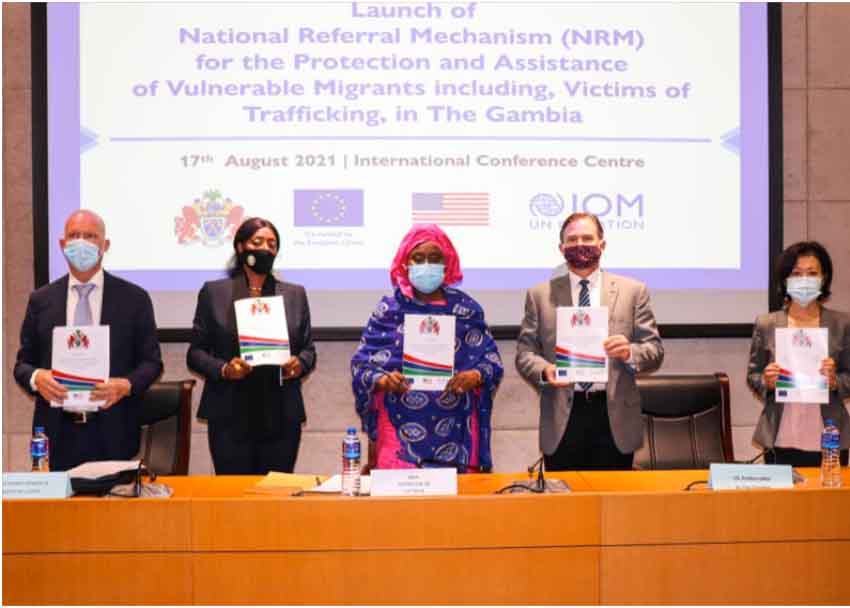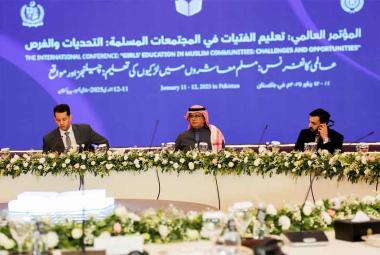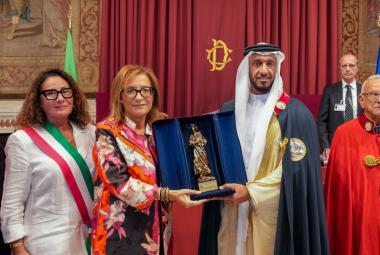By Awa Sowe
Human trafficking, also known as trafficking in persons means recruitment, transportation, transfer, harboring or receipt of persons, by means of threat or use of force or other forms of coercion, abduction, fraud, deception of the abuse of power or of a position of vulnerability or of the giving or receiving of payments or benefits to achieve the consent of a person having control over another person, for the purpose of exploitation.
Exploitation includes prostitution or other forms of sexual exploitation, forced labour or services, slavery or practices similar to slavery, servitude or the removal of organs.
The crime of human trafficking is complex and dynamic, taking place in a wide variety of contexts and difficult to detect. One of the greatest challenges in developing targeted counter-trafficking responses and measuring their impact is the lack of reliable, high-quality data related to the scale of human trafficking and the profile of victims.
Human trafficking takes place in every region of the world: Human beings are sold, bought and traded much like objects. Victims of trafficking end up in the hands of traffickers because they are being deceived, being forced or abducted.
Human trafficking and smuggling are two different crimes. However, the two are related and often intertwined.
Human trafficking is involuntary and victims are exploited, whereas smuggling is voluntary, yet still bears life-threatening risks. A smuggling case can become human trafficking if the victims are exploited, for example by being held for ransom, or to pay off a smuggling debt through forced labour or sex work.
To address the menace of human trafficking, relentless advocacy and awareness raising is imperative. In the Gambia, the agency responsible for advocacy, awareness raising, and prevention of trafficking in persons and coordination of efforts to that effect, is the National Agency Against Trafficking-In Persons (NAATIP).
The Head of investigations at NAATIP, Mr Joseph Y. Mendy said combating human trafficking calls for the collective participation of all and sundry, adding that this is the reason why the agency is keen on conducting series of trainings to arm people with knowledge on human trafficking.
He described the practice as a heinous one and said combating the menace is not just a legal obligation but a moral one in view of its severity to mankind. He maintained that human trafficking is a crime that preys on the most vulnerable of society, and acknowledged that with dedication and commitment of all, this lucrative enterprise will be suppressed.
Mary Mam Yassin Sey, a Justice, explained that trafficking in Persons, also referred to as human trafficking, is a form of modern-day slavery in which victims are subjected to force, fraud or coercion to compel them to provide commercial sex, debt bondage services or involuntary services.
“Invariably, any minor under the age of 18, involved in commercial sex is a victim of human trafficking,” she noted.
She further explained Trafficking-In Persons (Amendment) of 2010 has amended Section 28 of sub-section (4) of the 2007 Act by substituting the word (fifteen) to the word (fifty) and in sub-section 5 by substituting the word (life imprisonment) with the word sentence of death. This she added, undoubtedly reflects the seriousness of the offense under the Act, affirming that human trafficking is a global issue that requires coordinated effort from various stakeholders including the judiciary.
International and Regional Cooperation in the fight against human trafficking
The Inter-Agency Coordination Group against Trafficking (ICAT) is a policy forum mandated by the General Assembly to improve international cooperation and coherence in approaches to trafficking in persons. As an active member of the ICAT working group, UNHCR has contributed expertise to several policy papers and short issue briefs.
Trafficking in persons is also addressed in the Global Compact on Refugees (GCR) and the Global Compact for Safe, Orderly and Regular Migration (GCM), committing to end trafficking in persons, improve identification, screening and referral of victims of trafficking to appropriate processes and procedures and victim support, including identification of those with international protection needs. As a member of the OSCE Alliance against Trafficking, UNHCR has played a key role in the design and facilitation of the OSCE Live Simulation training on Combatting Human Trafficking along Migration Routes.
UNHCR also participates in country-level coordination structures on mixed movements in several countries, using these fora as avenues for addressing trafficking in persons comprehensively through a multi-stakeholder approach.
The National Referral Mechanism for Protection of Vulnerable Migrants, including Victims of Trafficking
On 17 August 2021, The Gambia launched its National Referral Mechanism (NRM) for the Protection and Assistance of Vulnerable Migrants, including Victims of Trafficking – the first comprehensive framework that outlines the roles and obligations of state and non-state actors to protect and promote the rights of migrants.
Aimed at strengthening multidisciplinary services for migrants, the NRM identifies clear steps for various stages of assistance, including identification assessments, referrals, family tracing, return, and reintegration.
The development of the NRM was made possible through the EU-IOM Joint Initiative for Migrant Protection and Reintegration, funded by the EU Emergency Trust Fund for Africa, and Supporting National Efforts to Combat Human Trafficking, funded by the US Department of State’s Office to Monitor and Combat Trafficking in Persons.
The process of developing the NRM commenced in February 2020, under the leadership of the Ministry of Gender, Children and Social Welfare and the Ministry of Justice. Following this, two working groups were established to map state and non-state service providers that were best equipped to deliver crucial assistance to vulnerable migrants. In institutionalizing the referral process to these services, the NRM improves cooperation and coordination among various stakeholders involved in identification, protection and sustainable reintegration of vulnerable migrants, including victims of trafficking.
Hon. Fatou Kineh, Minister of Gender, Children and Social Welfare affirmed that the NRM will strengthen the Government’s response and bring together all of The Gambia’s key service providers by establishing standardised guidelines and procedures for all service providers to closely adhere to.
She added that, it will therefore have a vital role to play in coordinating and optimizing support, including to returnees, and will contribute to the stability and security of our country.”
Furthermore, under the NRM, Standard Operating Procedures (SOPs) were validated in August 2020 specifically for the purpose of identifying specific roles and responsibilities and procedures to afford protection and assistance to vulnerable migrants, including victims of trafficking.
The Attorney General and Minister of Justice Hon. Dawda A. Jallow, said the fight against trafficking in persons is a priority task of the Government of the Gambia adding that the NRM institutionalises specific steps and roles for key ministries and other stakeholders.
The health dimensions of human trafficking
There are health dimensions to all the stages of trafficking. For people who are trafficked, health influences are often cumulative, making it necessary to consider each stage of the trafficking process (recruitment, travel/transit, detention/exploitation/re-trafficking, integration/return/re-integration). At each stage, women, men and children may encounter psychological, physical and/or sexual abuse and violence; forced or coerced use of drugs oralcohol; social restrictions and emotional manipulation; stress, shame and stigma; economic exploitation, inescapable debts; and legal insecurities. Risks often persist even after a person is released from the trafficking situation and only a small proportion of people reach post-trafficking support services or receive any financial or other compensation
Footnotes
https://rodakar.iom.int/news/gambia-launches-national-referral-mechanism-protection-vulnerable-migrants-including-victims-trafficking
https://www.ohchr.org/en/trafficking-in-persons







